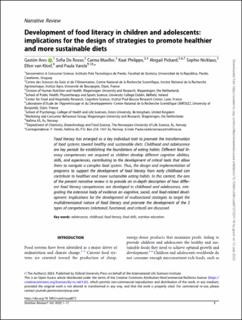| dc.contributor.author | Ares, Gastón | |
| dc.contributor.author | De Rosso, Sofia | |
| dc.contributor.author | Mueller, Carina | |
| dc.contributor.author | Phillipe, Kaat | |
| dc.contributor.author | Pickard, Abigail | |
| dc.contributor.author | Nicklaus, Sophie | |
| dc.contributor.author | van Kleef, Ellen | |
| dc.contributor.author | Varela, Paula | |
| dc.date.accessioned | 2023-07-13T07:09:55Z | |
| dc.date.available | 2023-07-13T07:09:55Z | |
| dc.date.created | 2023-07-11T14:00:55Z | |
| dc.date.issued | 2023 | |
| dc.identifier.issn | 0029-6643 | |
| dc.identifier.uri | https://hdl.handle.net/11250/3078516 | |
| dc.description.abstract | Food literacy has emerged as a key individual trait to promote the transformation of food systems toward healthy and sustainable diets. Childhood and adolescence are key periods for establishing the foundations of eating habits. Different food literacy competencies are acquired as children develop different cognitive abilities, skills, and experiences, contributing to the development of critical tools that allow them to navigate a complex food system. Thus, the design and implementation of programs to support the development of food literacy from early childhood can contribute to healthier and more sustainable eating habits. In this context, the aim of the present narrative review is to provide an in-depth description of how different food literacy competencies are developed in childhood and adolescence, integrating the extensive body of evidence on cognitive, social, and food-related development. Implications for the development of multisectoral strategies to target the multidimensional nature of food literacy and promote the development of the 3 types of competencies (relational, functional, and critical) are discussed. | |
| dc.description.abstract | Development of food literacy in children and adolescents: implications for the design of strategies to promote healthier and more sustainable diets | |
| dc.language.iso | eng | |
| dc.title | Development of food literacy in children and adolescents: implications for the design of strategies to promote healthier and more sustainable diets | |
| dc.title.alternative | Development of food literacy in children and adolescents: implications for the design of strategies to promote healthier and more sustainable diets | |
| dc.type | Peer reviewed | |
| dc.type | Journal article | |
| dc.description.version | publishedVersion | |
| dc.source.journal | Nutrition reviews | |
| dc.identifier.doi | https://doi.org/10.1093/nutrit/nuad072 | |
| dc.identifier.cristin | 2161976 | |
| dc.relation.project | Norges forskningsråd: 314318 | |
| dc.relation.project | Nofima AS: 202103 | |
| dc.relation.project | Nofima AS: 12047 | |
| dc.relation.project | EU/764985 | |
| cristin.ispublished | true | |
| cristin.fulltext | original | |
| cristin.qualitycode | 1 | |
